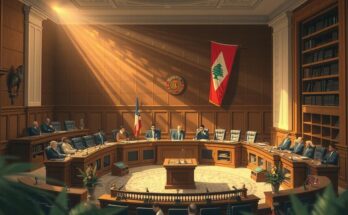The Sudanese military has regained the Republican Palace in Khartoum from rival paramilitary forces, marking a significant victory. Information Minister Khaled al-Aiser announced the achievement via social media. While this establishes military control over a crucial symbol of governance, sporadic fighting continues, and the humanitarian crisis in Sudan exacerbates, with ongoing reports of violence and human rights violations.
The Sudanese military has successfully reclaimed control of the Republican Palace in Khartoum, the last major stronghold of opposing paramilitary forces in the capital. Social media footage indicated that military personnel celebrated this victory during the holy month of Ramadan, specifically noting the date as the 21st day. In a revealing video, a military captain confirmed the troops’ presence inside the palace compound, which has suffered considerable damage throughout the conflict.
Khaled al-Aiser, the Information Minister of Sudan, celebrated the military’s achievement in a post on social media platform X, declaring that the flag has been raised and the palace is back under control. He emphasized that the journey for complete victory is ongoing. This strategic win is significant as the Republican Palace, located along the Nile River and historically pivotal, serves as a symbol of governance in Sudan.
The military has made significant progress recently under the leadership of General Abdel-Fattah Burhan, with the paramilitary Rapid Support Forces (RSF) largely expelled from Khartoum since fighting commenced in April 2023. Despite sporadic gunfire heard throughout the city, the nature of the conflict remains uncertain, as RSF has yet to acknowledge this strategic loss.
The RSF asserted control over al-Maliha, a key city in North Darfur near the borders of Chad and Libya, yet the military has acknowledged active fighting in the area without conceding defeat. The conflict, which has resulted in over 28,000 fatalities and dislocated millions, has created a dire humanitarian situation, characterized by extreme food scarcity and suffering.
Historically, the Republican Palace has been a focal point of power in Sudan, symbolizing significant moments in the nation’s journey since independence. The military has long viewed the palace as a priority target, launching numerous offensives to regain control over this politically charged site.
Sudan has experienced political upheaval since the ousting of President Omar al-Bashir in 2019, with a brief attempt at democracy collapsing after a military coup in 2021. The ongoing conflict between the military and RSF has further escalated tensions, with both sides facing accusations of human rights violations. The U.S. State Department has implicated the RSF in acts of genocide, though both factions contest these allegations.
In conclusion, the Sudanese military’s reclamation of the Republican Palace marks a pivotal moment in ongoing conflict, reflecting significant military gains against the RSF. This development, while symbolically charged, does not eliminate the complexities of the humanitarian crisis and ongoing violence within Sudan. The historical significance of the palace and continuing political instability remains a crucial aspect of the region’s landscape. The situation calls for urgent international attention to address the humanitarian needs and to uphold human rights.
Original Source: www.peeblesshirenews.com




